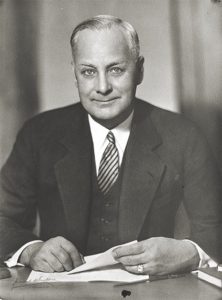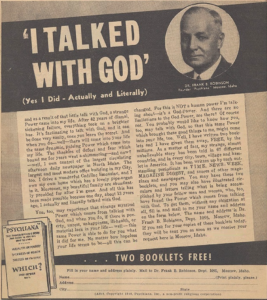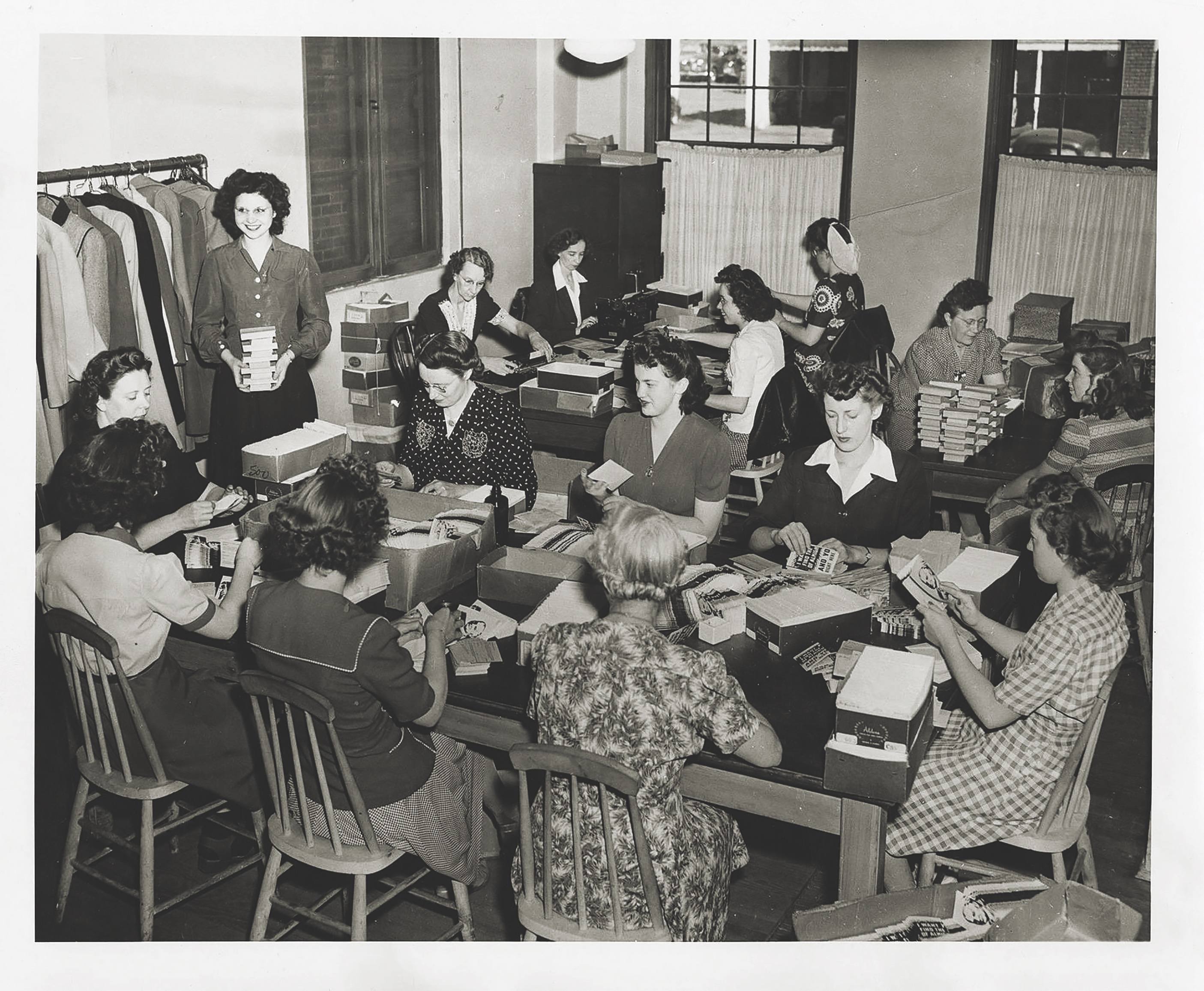In 1929, Frank Robinson invented America’s first mail-order religion. He called it “Psychiana,” a name that came to him in a dream, and hyped his creation in eyeball-grabbing magazine advertisements. “I TALKED WITH GOD,” one read. “Yes, I did, Actually & Literally.”

Robinson’s ads put readers on the spot. Did they want “Wealth or Poverty—Happiness or Despair—Which?” People preferring wealth and happiness could find those treasures, Robinson promised, by subscribing to his 20-lesson mail-order course in Psychiana, a “psychological religion” that not only revealed how to converse with God but also how to acquire godlike powers. The course cost $20—a buck a lesson—and during the Great Depression and World War II Americans by the thousands ante’d up, hoping for illumination.
If Robinson had “Actually & Literally” talked with God, it must have been an interesting chat. As Brandon R. Schrand writes in his 2020 biography, Psychiana Man, Robinson had led “a freewheeling, vagabond life of questionable employment history, reckless military service, alcoholism, imprisonment, compulsive lying, fraud and bankruptcy.” Of course, none of those flaws disqualify a man from becoming a religious leader in these United States.
Son of a Baptist minister, Frank Bruce Robinson was born in England in 1886. He was 10 when his mother died. In 1889, his father married a wealthy woman who repeatedly clashed with Frank. The minister solved that problem on Frank’s 16th birthday, signing the youth up for a 12-year stint in the Royal Navy.
Frank detested his time before the mast, faked an illness, and was discharged. He returned home, but not for long. In 1903, his father dispatched him to Canada as part of a shipload of orphans and paupers. For three years, he lived in an Ontario orphanage that rented its residents to farmers as cheap labor.
Fleeing the institution, Robinson began a period of drink-sodden folly. In Toronto in 1910, he joined the Royal Canadian Mounted Police, which soon expelled him for drunkenness. In Oregon in 1912, feigning American citizenship, he enlisted in the U.S. Navy, which quickly ejected him as a “chronic alcoholic.” In San Francisco in 1916, he joined the U.S. Army under a pseudonym. Shipped to the Philippines, he was imprisoned for “willful disobedience of orders” and discharged.
“I was useless and just a common drunk,” Robinson later recalled.
But in 1917 he quit drinking. He worked in pharmacies, peddled stocks, and sold self-help books door-to-door. He married a judge’s daughter, and in 1928 they settled in Moscow, Idaho, where Robinson, 42, worked in a drugstore while he concocted his new religion.
Fueled by coffee and cigarettes, he spent nights pounding a borrowed typewriter, banging out those mail-order Psychiana lessons—more than 200,000 words, many of them typed in capital letters. Calling himself “Dr. Robinson,” he promised his “REVOLUTIONARY TEACHING” would reveal how to use “DYNAMIC UNSEEN POWER” to perform miracles, including healing the sick. This mystical “God Power” could be accessed through breathing exercises and by repeating “I BELIEVE IN THE POWER OF THE LIVING GOD” over and over. Robinson warned students to “obey my instructions TO THE LETTER” or else “get nowhere, and only be a loser.”
He advertised Psychiana in pulp sci-fi and detective magazines. The hype worked: Thousands bought into his mail-order theology and Robinson soon had expanded Psychiana to include a magazine, a “Psychiana Brotherhood” club—monthly dues $2—a medical clinic in Moscow, and, for patients unable to make it to Idaho, mail-order medical diagnoses at $5 a pop. Robinson soon became the town’s largest private employer and a wealthy man.
But his dubious claims sparked a federal investigation and in 1936, an indictment cited Robinson for passport fraud. At his trial, in Moscow, prosecutors proved that Robinson had sworn, on his passport application, that he was an American, born in New York—a claim the evidence showed to be false. Robinson retorted that his mother had told him he was born while his parents were visiting New York, and he believed his mom. This amazing defense worked: hometown jurors acquitted him.
Irked, the feds moved to deport Robinson as an illegal immigrant until William Borah, Idaho’s powerful Republican senator, brokered a deal. Robinson would be deported but permitted to apply for readmission to the U.S, which was promptly granted.
“After the crucifixion comes the ascension,” Robinson crowed after his victory. “We know that divinity cannot be crucified.”

Using his legal troubles to raise money, Robinson cited his acquittal as proof that his “DYNAMIC UNSEEN POWER” really worked. He launched a radio show and a lecture tour, appearing on stage flanked by two stenographers who transcribed his every word, lest any godlike wisdom be lost. “The showman in him hungered for the energy of a live audience,” his biographer writes, “and the stage is where he felt at his best.”
In May 1940, as German armies were blitzing through France, Robinson instructed his followers to pause four times every day, close their eyes, visualize Adolf Hitler, and repeat “The spirit which is God will bring your downfall.” Robinson sent a telegram to French Prime Minister Paul Reynaud, informing him of Psychianians’ efforts on France’s behalf. “Consequently, you cannot lose,” he added.
In June, the Nazis seized Paris. Two weeks later, a heart attack nearly killed Robinson. Doctors ordered bed rest. Instead, he worked day and night smoking, slurping coffee, and typing so furiously that he taped his fingertips to keep them from bleeding. In two years, he wrote hundreds of articles and nine books. His prose became ever more bizarre. He said that “God had chosen me” to enlighten humanity. He suggested he might run for the U.S. Senate. He claimed to have seen his dog pass through closed doors. He claimed that he’d healed a pig’s bleeding tail simply by expressing sympathy for the punctured porker. And he proclaimed, “THE DEAD CAN BE BROUGHT BACK TO LIFE.”
After atomic blasts ended World War II, Robinson circulated a two-sided leaflet touting “The New Psychiana.” One side blared, “THIS CIVILIZATION IS DOOMED,” predicting that atomic war would soon kill most humans.
The other side proclaimed, “THIS IS GOOD NEWS,” detailing a post-apocalyptic utopia in which “all shall live FOREVER WITH THE GREAT SPIRIT WHICH IS GOD.”
In October 1948, Frank Robinson’s “DYNAMIC UNSEEN POWER” expired; the mail-order mystic died at 62. He was not “BROUGHT BACK TO LIFE,” but his widow and son managed to keep Psychiana alive for four years, repackaging and reselling Robinson’s writings. In 1952, they closed down the operation, blaming postal costs. Newsweek discerned a different cause: “Without the dynamic personality of the founder,” the magazine reported, “Psychiana seemed to be doomed.”





